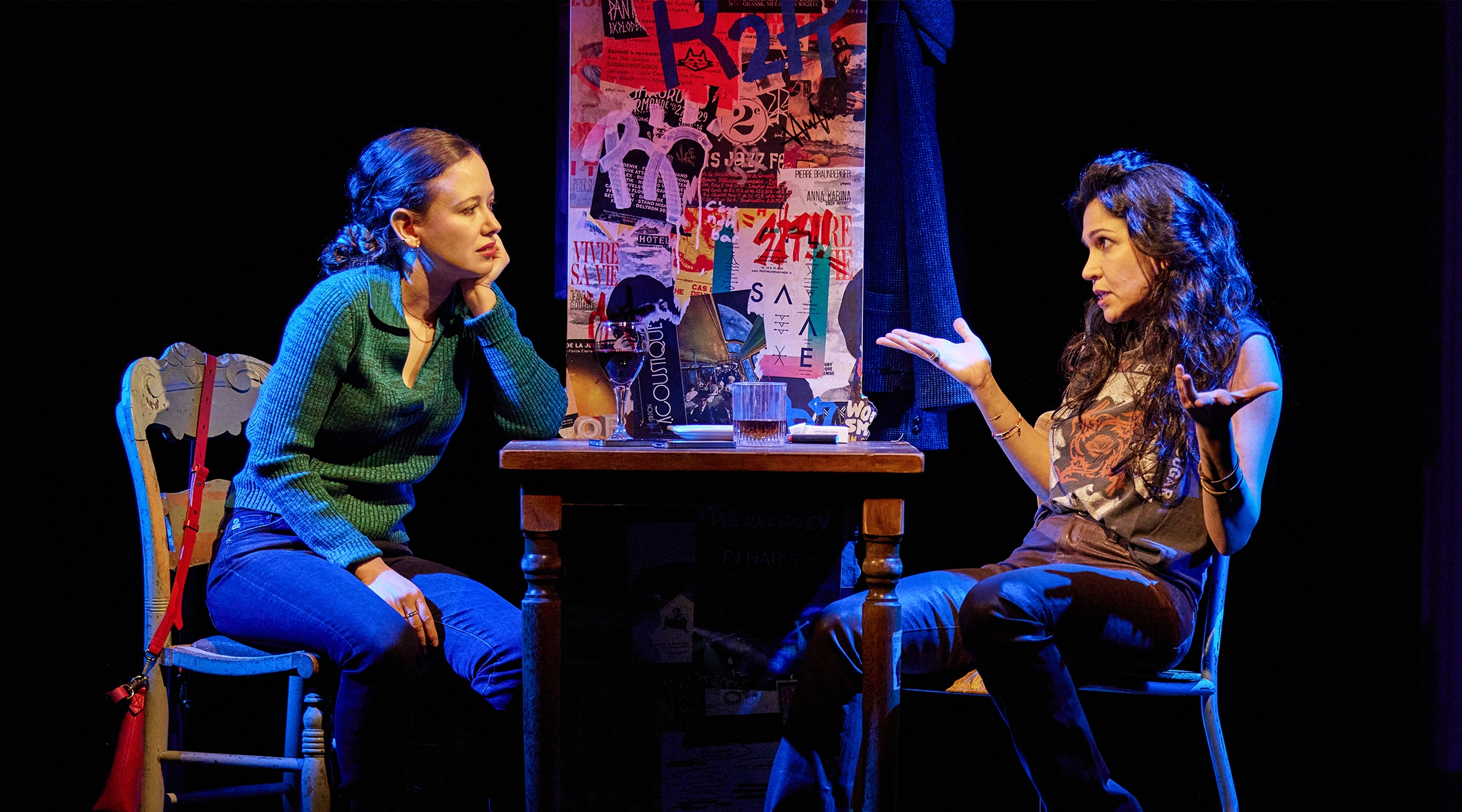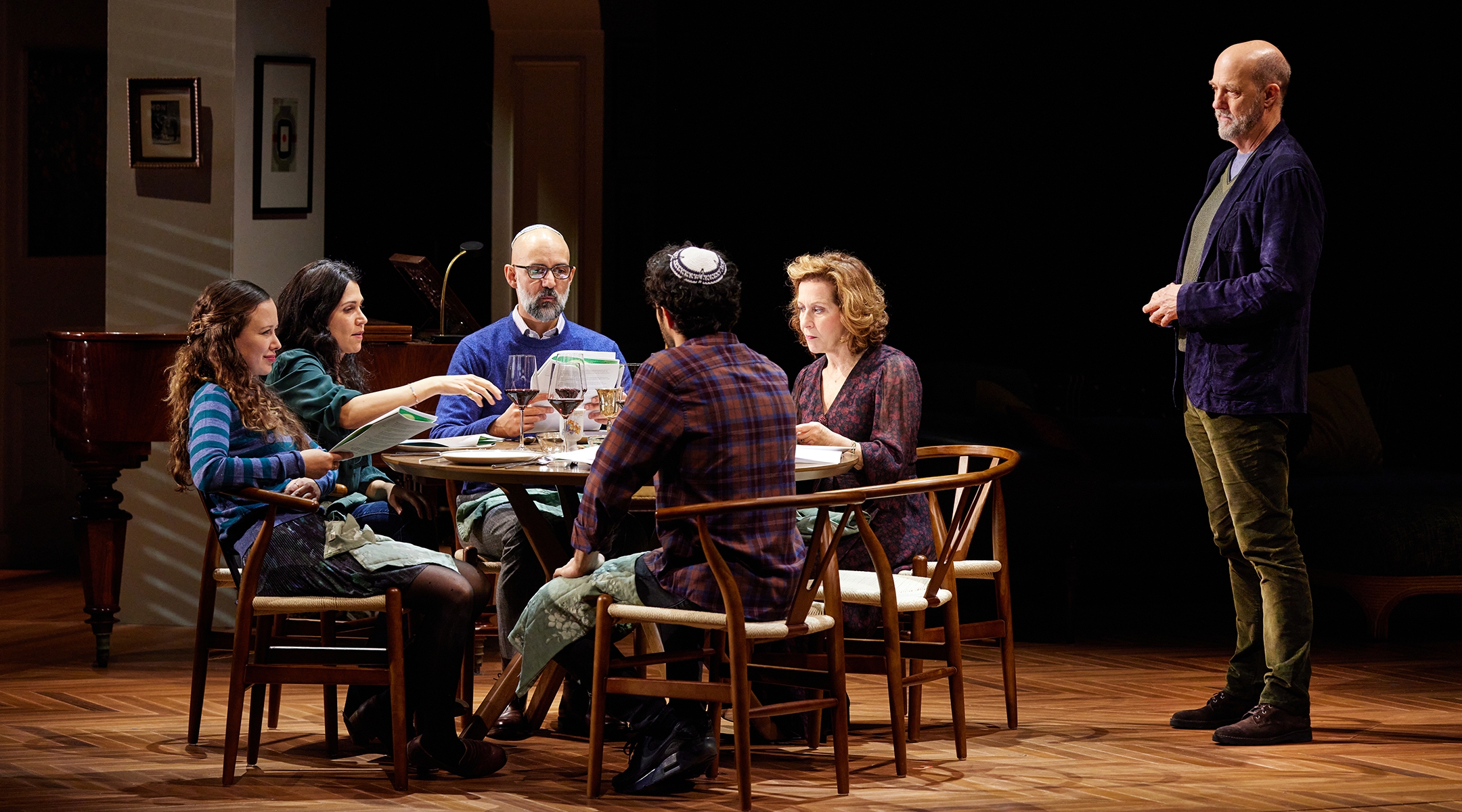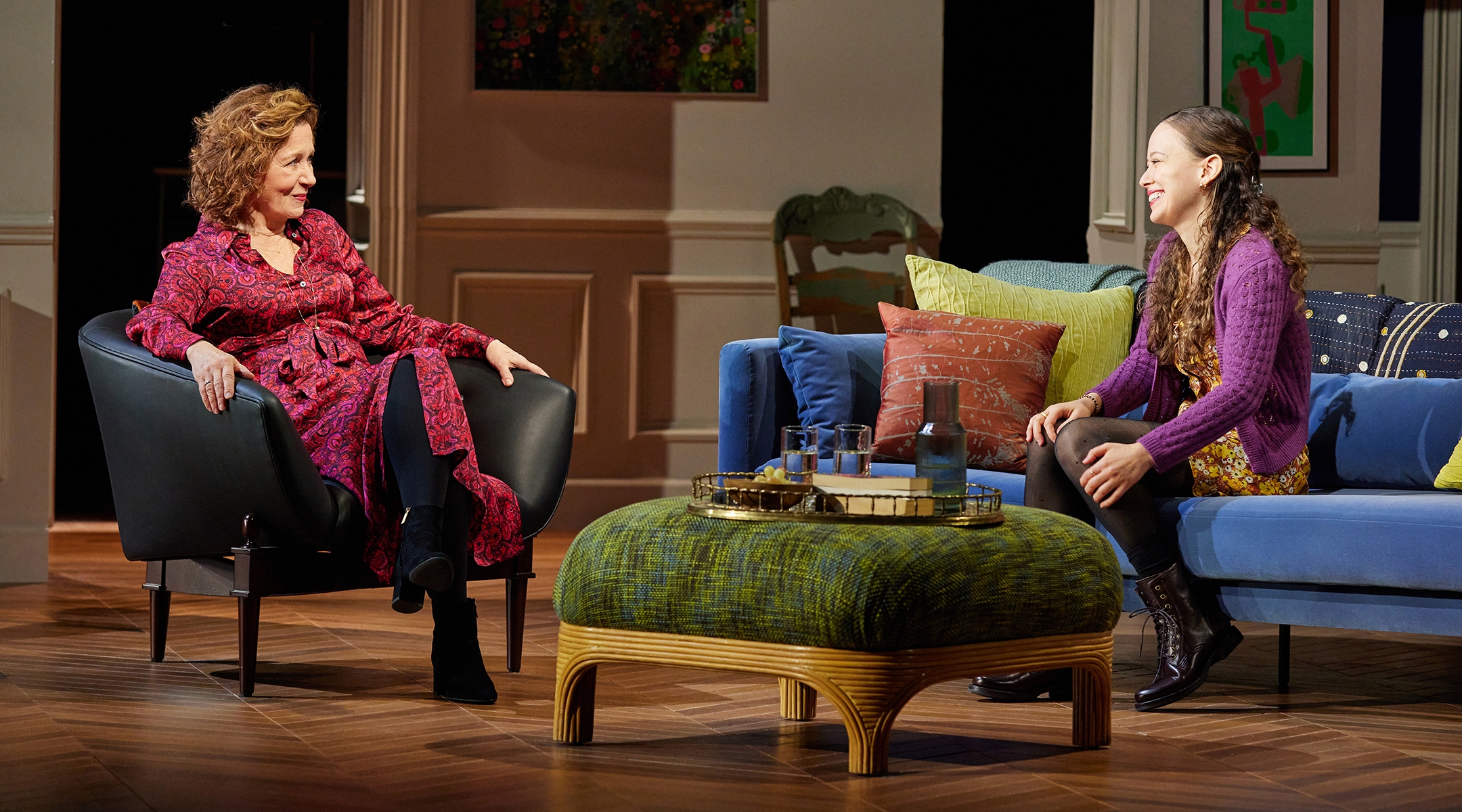(New York Jewish Week) — I’ll be honest: At the outset, a three-hour play about antisemitism did not sound like my idea of a good time. After all, as the editor of a Jewish publication, I spend much of my workdays writing about and thinking about the world’s hatred of Jews.
But my trepidation evaporated within minutes of the first scene of “Prayer for the French Republic,” Josh Harmon’s Broadway play about generations of a French Jewish family grappling with their Jewish identity, their French identity and the ways in which these identities invariably clash and overlap with one another.
From the opening scenes — in which we are introduced to the Benhamou family, including a somewhat brittle but loving matriarch, Marcelle Salomon Benhamou (Betsy Aidem); a brilliant but sarcastic daughter Elodie (Francis Benhamou); father Charles (Nael Nacer) and a religiously curious son Daniel (Aria Shahghasemi) — “Prayer for the French Republic” felt like I was looking in a mirror. Or, perhaps a more accurate description would be watching a home movie — a term that has fallen out of favor but uniquely describes that experience of observing a family’s everyday interactions as seen through the lens of someone who is a part of, rather than separate from, the family depicted on screen.
The play opens in Paris in 2016, with the family in turmoil after Daniel, who wears a kippah, gets attacked on the street just before sundown on Shabbat. It’s a time of heightened antisemitism in France, most notably after the 2015 attack by an Islamist on a kosher supermarket, which killed four and terrified Paris’ Jewish community to the core. Amid fears for their safety, over the course of three hour-long acts (punctuated by two 10-minute intermissions), the Benhamous debate joining the record number of French Jews who are moving to Israel.
The nearly present-day family’s story is punctuated by flashbacks to 1944-1946, spotlighting Marcelle’s great-grandparents, Irma and Adolphe Salomon, who miraculously survived World War II by hiding themselves in their Paris apartment — unlike their other family members who had fled to the United States or Cuba, or endured the horrors of the Nazi concentration camps.
“Prayer for the French Republic” was first mounted off-Broadway in 2022, garnering awards and rave reviews. And when it moved to Broadway earlier this month, many of its key players, including director David Cromer and stars Aidem and Francis Benhamou, came along for the ride.
I had the chance to speak with Aidem, who most recently played Grandma Emilia in another recent Broadway play about antisemitism, Tom Stoppard’s Tony Award-winning “Leopoldstadt.” The 66-year-old Upper West Sider shared with me her thoughts on the play’s relevance in 2024, her personal experiences with Judaism and why live theater is an “alchemical” experience.
This interview has been condensed and lightly edited.

Molly (Molly Ranson) and Elodie (Francis Benhamou) debate Israel in a scene from “Prayer for the French Republic.” (Jeremy Daniel)
Watching “Prayer for the French Republic,” I felt like I actually knew the Benhamou family, and that I knew your character personally. Did you feel this way when you first “met” Marcelle? What was your reaction when you read the script the first time?
I got the script at the very beginning of 2020. I was set to go to Fort Leavenworth, Kansas, to direct a bunch of actors for the Arts in the Armed Forces at the army base and the army prison there. I read the script before I left. They wanted to do a startup workshop — I was like, I’ve got to get out of Kansas. I literally flew back a day early to do the workshop. That’s because when I read the play, and I read the part of Marcelle, I was blown away by how I understood who she was, and I couldn’t believe the breadth of what the writer Josh Harmon was able to give to one character in a story as beautiful as this.
The world is a very different place now than it was when the play premiered off-Broadway in January 2022. After the massacre in Israel on Oct. 7 and the turmoil over the war in Gaza, how do you think the play hits differently with audiences today?
I think the play, because it is a closeup, people see themselves in this circumstance. It becomes incredibly relatable, it’s personal. It’s not a sweeping epic. I think being able to recognize people going through something that you feel you’re going through privately — when you watch it in public it expands your sense of belonging to a greater community.
How does that happen? Because I agree — watching the play was somehow uplifting, despite the difficult subject matter. The audience was laughing and engaged. Is that the magic of theater? What is it about this play that makes it feel comforting in a really fraught time?
I think there’s something that alchemically happens in live performance. [Director] David Cromer is incredibly insistent on true behavior — not doing what he calls “theatrical behavior” but really letting things get uncomfortable, showing their smudges, showing where people lose their footing. When audiences see that, they instantly enter into the center of the character’s anguish, because they’re not perfect. They’re imperfect. I think it helps them relax and go, “Oh, I do that too. I know what that feels like.” I think that’s a tribute to Josh’s writing and tribute to David’s directing, and the actors he’s assembled, who are willing to be foolish and willing to be lost. And I think that’s what makes the experience universal.
You’ve had a couple of heavy years, coming off “Leopoldstadt,” where you play Emilia, another Jewish matriarch, this time in a family epic set before and during the Holocaust. What similarities do you see between these two characters?
Emilia supposedly walked from Kyiv to Lviv on foot, which is something like over 500 miles, during one of the pogroms — she’s a survivor. She was very tough. I mean, the line that I said at the end of the 1899 [scene] was, “They used to hate us for killing Christ, now they hate us for being Jews. God, give my grandchildren the desert.” So Theodor Herzl was, at that moment, coming up with this plan [for a Jewish state in Palestine] that a lot of the Viennese thought, “Oh, who wants to give up high society and the culture that we live in, which is the best of Europe, and go live in some terrible desert?” That has a very similar theme to a family in Paris [in “Prayer for the French Republic”] thinking they live in the best, most cultured city in the world, and thinking the only safe place to go is Israel. That similarity is interesting to me.

The Benhamou family of Paris conducts a Passover seder in a scene from Broadway’s “Prayer for the French Republic.” (Jeremy Daniel)
How would you describe your own Jewish identity?
I was raised in Phoenix, Arizona, which didn’t have a large Jewish community. But I noticed in like fifth or sixth grade that all the boys were going to this thing called Hebrew school. So I asked my mom if I could also go to Hebrew school. I was a year younger than my brother and she’s like, “I’m not doing two carpools a week. You can go to your brother’s class.” So I was the only girl in my Hebrew school class, and I was the first girl at my temple to be bat mitzvahed. This was the ’60s. The only reason I kept at it was because I figured out, early on, I had a good ear and photographic memory. So they [the teachers] thought I was extremely proficient, but it was just that I figured out I had a gift.
Was this the start of your acting career?
It was a skill I didn’t know I had; it just came out at that time. Also my father, who had been raised more religiously than I, I could feel his pride that I would take an interest in this. And then I raised my son — he went to Hebrew school, he was also bar mitzvahed, even though I was a single mom and his father was Catholic. I just was like, “Yeah, we’re gonna carry this on.”
“Prayer for the French Republic” is such a deeply Jewish play. How would you describe its audience? Do you think it resonates with non-Jews?
Oh, absolutely. I have a lot of friends that aren’t Jewish, who said, “I really, really loved the play. I learned a lot.” I think Elodie’s monologue is very helpful, in a certain way, for people to say, “Gee, I didn’t think about the size of Indonesia and Pakistan and Nigeria and India being so vastly larger [than Israel]. But why is our news cycle so fixated on that?” I think people learn a lot; I think they say, “It doesn’t matter that this family is Jewish — the interaction between the siblings and the parents and the children is universal.” The actual crisis of the play has to do with something else, but their internal family dynamic is universal.
“Prayer for the French Republic,” a production of the Manhattan Theatre Club, is at the Samuel J. Friedman Theater (261 West 47th St.) through March 3. Click here for tickets and information.
The New York Jewish Week brings you the stories behind the headlines, keeping you connected to Jewish life in New York. Help sustain the reporting you trust by donating today.





